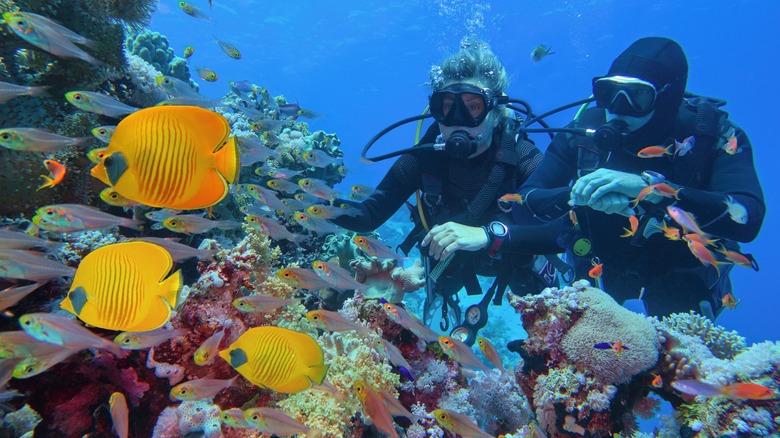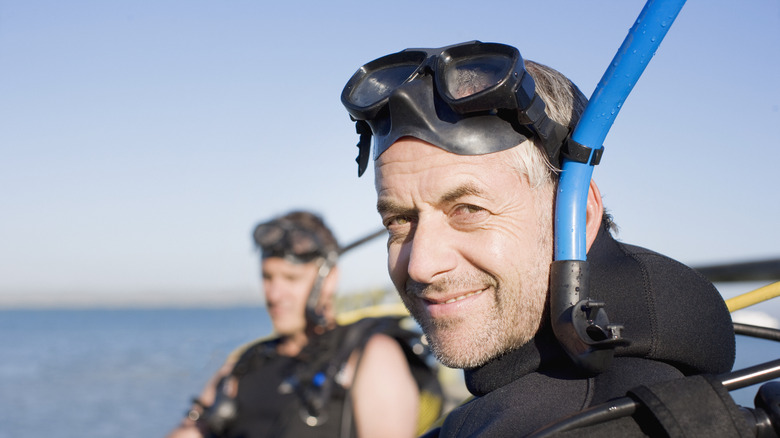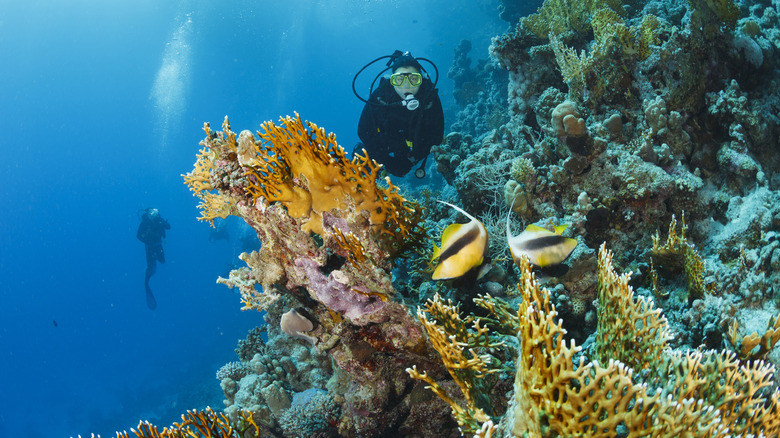The Most Dangerous Watersport In The World Is Unsettlingly Popular
Schools of tropical fish, colorful coral reefs, and sunken shipwrecks are magical sights waiting to be discovered underwater for any diver who decides to strap on a tank and explore the depths below the surface. The stunning sea life and the appeal of breathing under the surface is an experience that beckons to many people. However, scuba diving is an inherently risky sport that is not suitable for everyone. It requires extensive training, physical strength, and even emotional stability to remain safe at recreational depths beneath the surface. Staying underwater for an extended period poses a number of risks.
189 deaths that occurred globally in 2018 were attributed to scuba diving, according to an annual report compiled by Divers Alert Network (DAN), an organization dedicated to the safety of the sport. Yet the popularity of scuba diving continues to rise, with the United States experiencing an overall increase of 7.3% in participation in 2022 compared to the previous year (via Medium).
The rise in participation is due to an increase in "casual divers," those who have only done eight dives or less during the course of the year. These divers are often choosing between a variety of activities while on vacation, and scuba diving just happens to be one of the choices. The problem with this approach is that participants can easily underestimate the skills necessary to dive safely.
Good training is necessary
Many of the problems that lead to fatal diving accidents can be attributed to three factors: running out of air, becoming entangled or trapped underwater, or having a problem with the equipment. One startling statistic in the DAN report indicates that 15% of these fatalities can be attributed to cardiovascular disease, which implies that many people are not prepared for the physical exertion required for the sport. In addition, about half of the deaths occurred with divers who had performed fewer than 20 dives in the previous 12 months. This indicates that beginner divers might easily become confused about how their equipment works or they may not know how to handle an emergency underwater. This type of situation can cause them to panic if they haven't been trained properly, with potentially disastrous results.
The rise in popularity of scuba diving as casual recreation has given rise to the "resort scuba course." Many people who plan a seaside vacation have not committed to obtaining an Open Water Diver certification from PADI, the Professional Association of Diving Instructors, or another reputable association. Experienced divers who are accredited with this certification have spent an average of 25 to 30 hours in the classroom, the swimming pool, and in several introductory open water dives. They discuss topics such as proper equipment usage and techniques for managing emergencies. Students practice clearing water from their masks, learn about buoyancy control, and rehearse the steps needed to ascend safely to the surface.
Preparation is key
In contrast, a resort scuba course may only last one or two hours. It provides vacationers with an introduction to the sport, but the class doesn't include the same training that is part of the Open Water certification. Maureen Rayman is a teacher at Aquatic Adventures Scuba Academy in Alexandria, Virginia, and is a member of PADI. She says, "Resort courses give guests a taste of diving under the supervision of an instructor at all times," per Seattle Times. However, she adds, "That's the way it's supposed to be. Whether the resorts abide by that is another thing."
Even though the resorts that offer training are supposed to host supervised diving experiences in a safe setting, each resort approaches this task differently, and it's hard to predict what can happen in the open ocean. It's easy to become disoriented, out of breath, or confused while underwater. One of the risks of breathing compressed air while descending deep below the surface is the chance of developing nitrogen narcosis. This condition is where nitrogen is absorbed into the bloodstream, which can slow the nervous system and impair a diver's judgment, similar to being intoxicated. While this type of situation is not common, it's hard to predict how and when it might affect a new diver. Even though resort courses have become popular and seem convenient, proper training and certification is the key to enjoying this sport that opens the door to the magic under the ocean's surface.


